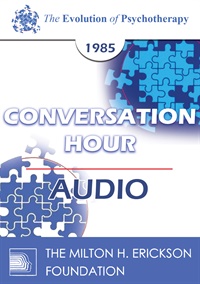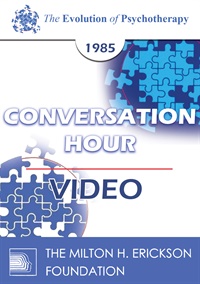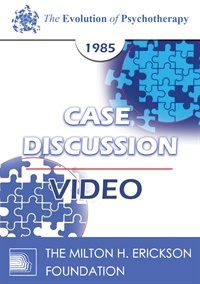
- Average Rating:
- Not yet rated
- Topic Areas:
- Conversation Hours | Psychotherapy
- Categories:
- Evolution of Psychotherapy | Evolution of Psychotherapy 1985
- Faculty:
- Zerka Moreno
- Duration:
- 1 Hour
- Format:
- Audio Only
- Original Program Date:
- Dec 12, 1985
- Short Description:
- Conversation Hour 06 featuring Zerka Moreno.
- Price:
- $15.00 - Base Price
Tags: Psychotherapy Zerka Moreno

- Average Rating:
- Not yet rated
- Topic Areas:
- Conversation Hours | Psychotherapy
- Categories:
- Evolution of Psychotherapy | Evolution of Psychotherapy 1985
- Faculty:
- Carl Rogers, PhD
- Course Levels:
- Master Degree or Higher in Health-Related Field
- Duration:
- 56:02
- Format:
- Audio and Video
- Original Program Date:
- Dec 12, 1985
- Short Description:
- Conversation Hour 07 featuring Carl A Rogers, PhD.
- Price:
-
Sale is $29.00
price reduced from Base Price - $59.00
Tags: Carl Rogers Psychotherapy

- Average Rating:
- Not yet rated
- Topic Areas:
- Conversation Hours | Psychotherapy
- Categories:
- Evolution of Psychotherapy | Evolution of Psychotherapy 1985
- Faculty:
- Mary Goulding, MSW | Robert L. Goulding, MD
- Course Levels:
- Master Degree or Higher in Health-Related Field
- Duration:
- 56:50
- Format:
- Audio and Video
- Original Program Date:
- Dec 12, 1985
- Short Description:
- Conversation Hour 08 featuring Robert L Goulding, PhD, and Mary Goulding, MSW.
- Price:
-
Sale is $29.00
price reduced from Base Price - $59.00
Tags: Psychotherapy Goulding

- Average Rating:
- Not yet rated
- Topic Areas:
- Case Discussions | Psychotherapy
- Categories:
- Evolution of Psychotherapy | Evolution of Psychotherapy 1985
- Faculty:
- James F. Masterson, MD | Salvador Minuchin, MD | Zerka Moreno | Paul Watzlawick, PhD
- Course Levels:
- Master Degree or Higher in Health-Related Field
- Duration:
- 1:01:34
- Format:
- Audio and Video
- Original Program Date:
- Dec 12, 1985
- Short Description:
- Case Discussion Panel 02 featuring James F. Masterson, MD, Salvador Minuchin, MD, Zerka Moreno, and Paul Watzlawick, PhD. Moderated by Ann Wright-Edwards, MS.
- Price:
-
Sale is $29.00
price reduced from Base Price - $59.00

- Average Rating:
- Not yet rated
- Topic Areas:
- Clinical Presentations | Psychotherapy | Storytelling
- Categories:
- Evolution of Psychotherapy | Evolution of Psychotherapy 1985
- Faculty:
- Erving Polster, PhD
- Course Levels:
- Master Degree or Higher in Health-Related Field
- Duration:
- 56:21
- Format:
- Audio and Video
- Original Program Date:
- Dec 12, 1985
- Short Description:
- Educational Objectives: To describe how a story was evoked To indicate the meanings, implied or explicit, to the story which evolved
- Price:
-
Sale is $29.00
price reduced from Base Price - $59.00

EP85 Clinical Presentation 10 - Using Metaphor and the Interspersal Technique - Jeffrey K. Zeig, PhD
- Average Rating:
- Not yet rated
- Topic Areas:
- Clinical Presentations | Interspersal | Metaphors | Psychotherapy
- Categories:
- Evolution of Psychotherapy | Evolution of Psychotherapy 1985
- Faculty:
- Jeffrey Zeig, PhD
- Course Levels:
- Master Degree or Higher in Health-Related Field
- Duration:
- 56:58
- Format:
- Audio and Video
- Original Program Date:
- Dec 12, 1985
- Short Description:
- Educational Objectives: To describe the interspersal technique To describe how to use metaphors and symbols in directed therapeutic fashion
- Price:
-
Sale is $29.00
price reduced from Base Price - $59.00

- Average Rating:
- Not yet rated
- Topic Areas:
- Invited Addresses | Psychotherapy | History of Psychotherapy | Family Systems | Family Therapy
- Categories:
- Evolution of Psychotherapy | Evolution of Psychotherapy 1985
- Faculty:
- Murray Bowen, MD | James F. Masterson, MD
- Duration:
- 1:32:08
- Format:
- Audio Only
- Original Program Date:
- Dec 12, 1985
- Short Description:
- Educational Objectives: To know how family systems therapy helps therapists to construct effective interventions To help psychotherapists keep an open mind to science To help psychotherapists assist patients to form clear choices in their interactions
- Price:
- $15.00 - Base Price

- Average Rating:
- Not yet rated
- Topic Areas:
- Invited Addresses | Family Therapy | Psychotherapy
- Categories:
- Evolution of Psychotherapy | Evolution of Psychotherapy 1985
- Faculty:
- Salvador Minuchin, MD | Zerka Moreno
- Course Levels:
- Master Degree or Higher in Health-Related Field
- Duration:
- 1:20:57
- Format:
- Audio and Video
- Original Program Date:
- Dec 12, 1985
- Short Description:
- Invited Address Session 3 - Part 2 - My Many Voices: Personal Perspectives on Family Therapy featuring Salvador Minuchin, MD. With discussant Zerka Moreno. Moderated by Sharon Cottor, MSW.
- Price:
-
Sale is $29.00
price reduced from Base Price - $59.00

- Average Rating:
- Not yet rated
- Topic Areas:
- Invited Addresses | Psychotherapy | Communication | Therapist Development
- Categories:
- Evolution of Psychotherapy | Evolution of Psychotherapy 1985
- Faculty:
- Paul Watzlawick, PhD | Ernest Rossi, PhD
- Course Levels:
- Master Degree or Higher in Health-Related Field
- Duration:
- 1:20:53
- Format:
- Audio and Video
- Original Program Date:
- Dec 12, 1985
- Short Description:
- Educational Objectives: To trace the development of therapeutic language from interpretation to injunctions To show the effect that this evolution has had on the idea of "reality adaptation," highlight the "as if" nature of our interpretations
- Price:
-
Sale is $29.00
price reduced from Base Price - $59.00

- Average Rating:
- Not yet rated
- Topic Areas:
- Invited Addresses | Existential Therapy | Psychotherapy | Phenomenology
- Categories:
- Evolution of Psychotherapy | Evolution of Psychotherapy 1985
- Faculty:
- Ronald Laing, MD | Thomas Szasz, MD
- Course Levels:
- Master Degree or Higher in Health-Related Field
- Duration:
- 1:26:01
- Format:
- Audio and Video
- Original Program Date:
- Dec 12, 1985
- Short Description:
- Educational Objectives: To know the theory behind the use of social phenomenology and existential philosophy in psychotherapy
- Price:
-
Sale is $29.00
price reduced from Base Price - $59.00
Please wait ...

